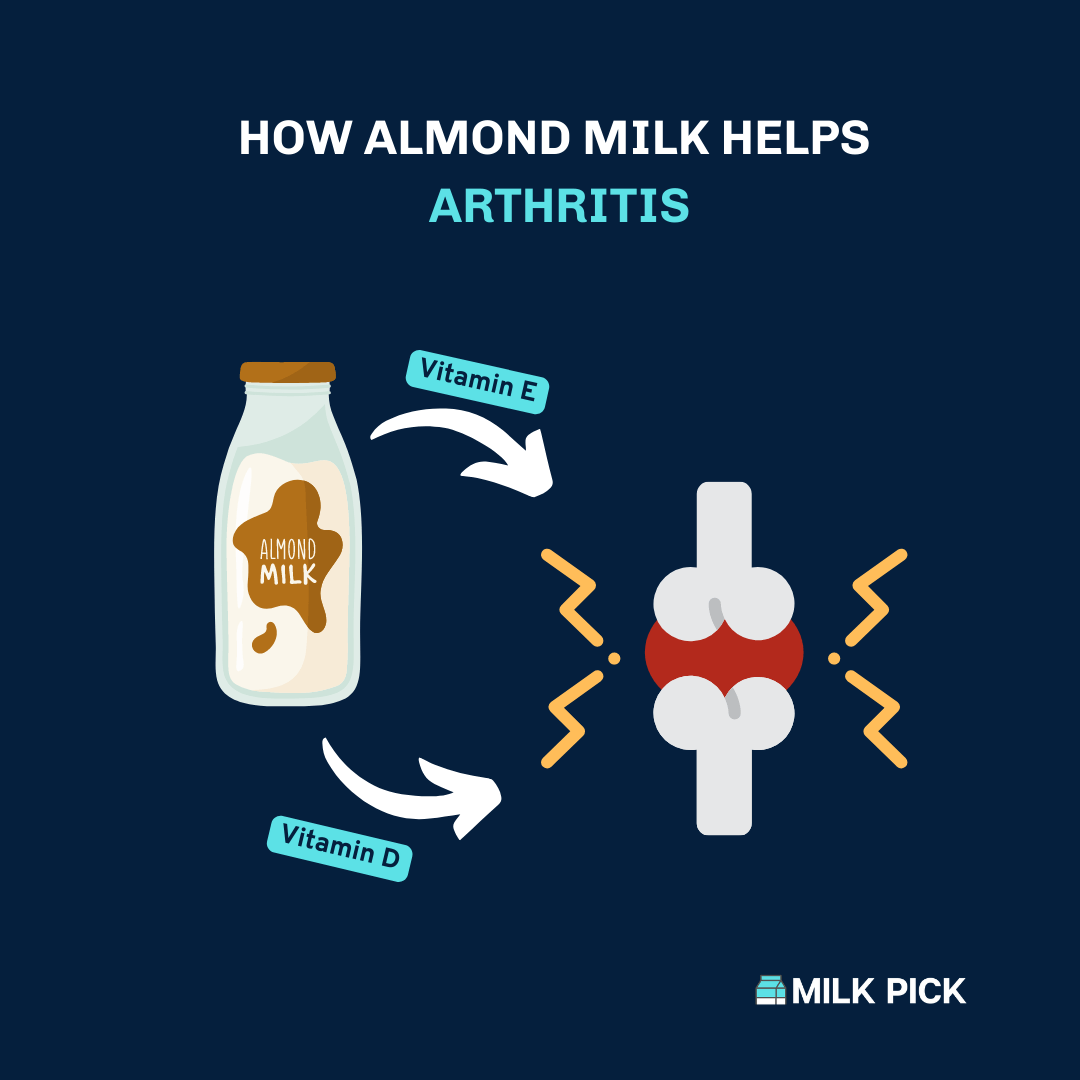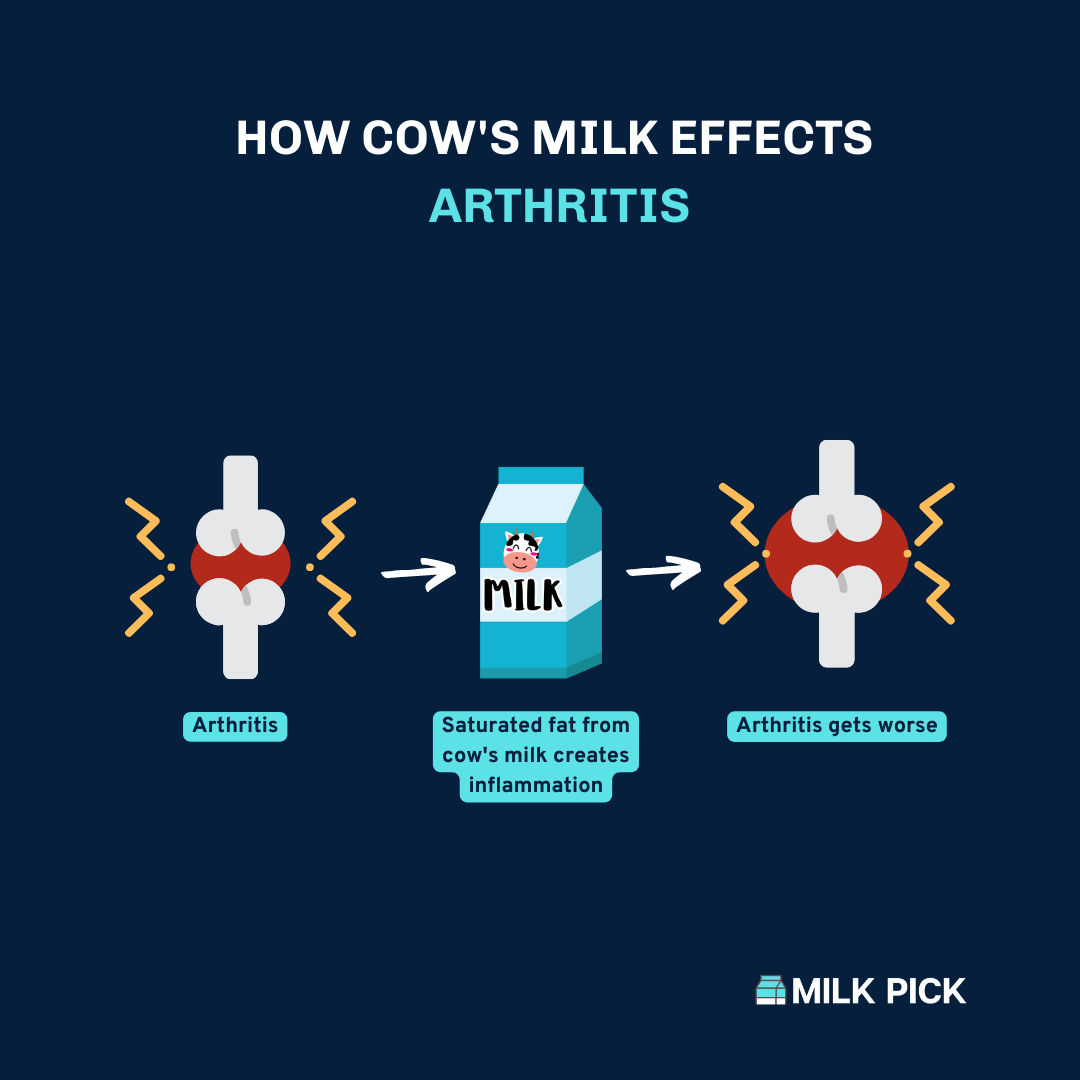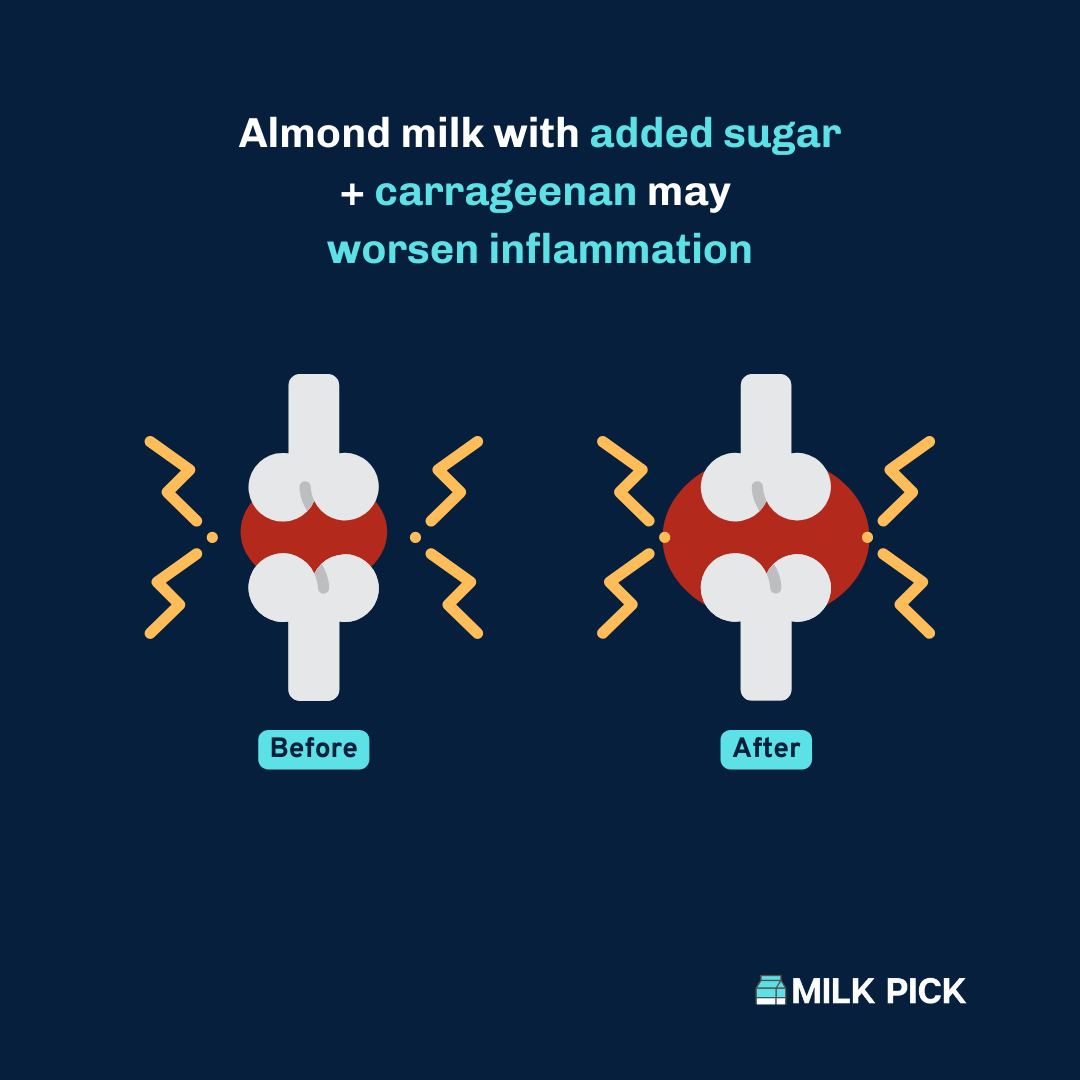Diet plays a large role in managing symptoms related to arthritis. When it comes to refining your diet to best manage your symptoms, you might be asking yourself, “Is almond milk good for arthritis?”
Almond milk is an excellent choice for reducing symptoms related to arthritis because it reduces the joint inflammation that causes pain. In particular, unsweetened almond milk that is fortified with vitamin D may help you to maintain healthy joints and reduce your symptoms.
This article will explain the ins-and-outs of how almond milk helps arthritis and help you decide which almond milk will be a good fit for your joints.
How Does Almond Milk Help Arthritis?
Almond milk helps reduce your current arthritic symptoms while also decreasing your risk for worsening symptoms by helping you maintain healthy bones.
The number one reason almond milk will help ease the pain caused by your arthritis is that it lowers the amount of inflammation in the joint space.
Without inflammation crowding in the joint space, you are less likely to experience joint swelling. This allows the synovial fluid to circulate with greater ease to lubricate your joints as you move.
In addition to flushing out inflammation, almond milk that is fortified with vitamin D will assure that your bones stay strong to maintain healthy joint surfaces.

What Exactly is Inflammation?
Inflammation is a word you’ve probably heard thrown about quite often in the medical world. It generally gets a bad rep as it is typically associated with pain and dysfunction.
Truthfully, inflammation is not in and of itself a bad thing. Inflammation that hangs around too long is what causes the problem.
Inflammation is simply your body’s natural signal that tissue is damaged and that your body needs to send healing nutrients to that area. This typically results in aching and swelling in the surrounding area as your body works to heal the damaged region.
Healthy inflammation is a short-lived response, but in chronic conditions like arthritis, you can get what is called low-grade inflammation that overstays its welcome.
Here's a video with more information about what inflammation is, how to spot it, and tips for dealing with it.
The Role of Inflammation in Arthritic Pain
Now you might be thinking at this point, “I thought the pain was happening because my joints are bone on bone.”
While there are some mechanical contributions to your arthritic pain, research is finding that chronic inflammation appears to play a more significant role in determining whether or not you’ll have pain.
When inflammation is present in the joint, it interacts with the cells located on the joint surface to send pain signals up to your brain.
And if this inflammation becomes chronic through poor diet or other factors, you can see why your joint may get more irritated.
This is why managing overall inflammation levels in your body may be one of the most helpful approaches for reducing arthritic pain if you do not want to replace the joint.
Related: Is Almond Milk Good for Seniors?
How Traditional Cow Milk Effects Arthritis
Now that you know that you need to aim to minimize inflammatory foods, it’s time to talk about how traditional cow milk is related to inflammation.
Your standard cow milk in the store contains what are called saturated fats. Saturated fats are what generally gives milk its recognizable creamy texture.
These saturated fats have been demonstrated in research to heighten inflammation throughout your body.
The saturated fats also contribute to clogging up your blood vessels, which can reduce the flow of helpful circulation to your joints.
If you are going to opt for cow-based milk in your diet, you may want to choose a low-fat option to avoid increasing inflammation and keep your arthritic symptoms at bay.

How Does Almond Milk Reduce Inflammation
Almond milk qualifies as an anti-inflammatory liquid because it is a good source of vitamin E and does not contain saturated fats.
Vitamin E is a powerful antioxidant that can neutralize free radicals in your body that can increase inflammation.
In particular, the research has shown that vitamin E is especially effective at reducing inflammation related to arthritis and could even serve as a potentially disease-modifying drug.
Almond milk also doesn’t contain saturated fats, which we discussed lead to increased levels of inflammation in your body.
With vitamin E and no saturated fats, you couldn’t ask for a better anti-inflammatory milk option.
How Much Vitamin E Needs to be in Almond Milk to Help Arthritis?
Most almond milk on the market contains somewhere between 46% to 50% of your daily value of vitamin E, making it an excellent source of this antioxidant.
Just two 8oz glasses of almond milk a day could assure that you have adequate vitamin E levels to flush out inflammation in your arthritic joints.
Science has not yet established an ideal amount of vitamin E needed per day to reduce the inflammation related to arthritis. However, a good general rule of thumb is to aim for 100% of the daily value to assure that you have enough vitamin E available.
Related: Is Almond Milk Anti-Inflammatory?
The Relationship Between Vitamin D and Arthritis
In addition to focusing on an anti-inflammatory diet, you will want to make sure you’re getting enough vitamin D if you have arthritis.
Vitamin D is a vitamin that is essential for your body to be able to build healthy bones. It works as a team with calcium to optimize your overall bone health.
This is why people who are low in vitamin D tend to develop conditions like osteoporosis. Interestingly enough, studies have shown that individuals with low levels of vitamin D are also more likely to develop arthritis.
Consequently, supplementing with vitamin D is theorized to have a potentially protective effect for both early development and preventing the worsening of arthritis at this time.
Often, commercial almond milk will come fortified with vitamin D. Make sure to check the back of the label so you can determine the percentage of the daily value in each serving to see if it will meet your personal vitamin D needs.
Does Almond Milk Fortified with Vitamin D Help with Arthritic Pain?
Now you know that almond milk fortified with vitamin D will help to improve the quality of your bones. But does having the vitamin D fortified version matter when it comes to helping alleviate your pain?
It’s a totally fair question. Early research has found that in individuals with knee arthritis, vitamin D seems to help lessen symptoms.
However, the role of vitamin D in relation to pain with arthritis remains unclear as the research is limited.
Because it is so easy these days to find almond milk that is fortified with vitamin D in the grocery store, it’s probably best to go with this option for the bone-based benefits regardless of its impact on the pain.
Related: Is Almond Milk Good For Cholesterol?
The Effects of Sweetened Almond Milk on Arthritis
After you’ve found an almond milk option fortified with vitamin D for your arthritis, you will also want to consider whether or not there is added sugar.
Sugar has been linked to increasing levels of inflammation in the body. And remember that inflammation is the primary reason you will experience pain in relation to your arthritis.
Also, research has demonstrated that even when sugar is only present in small amounts in liquid beverages it still increases inflammation in your body.
No need to stress because there are plenty of unsweetened options available. Just be sure to check the nutrition label on the back.
Better yet, you can make your almond milk at home and have even more control over the ingredients added.

The Effects of Carrageenan in Almond Milk on Arthritis
In addition to avoiding sugar in your almond milk, there is one other ingredient to watch out for in almond milk that could make your arthritis symptoms worse—carrageenan.
Carrageenan is a common additive in commercial almond milk used to help modify the texture of the almond milk.
Unfortunately, this additive has been found in multiple studies to increase inflammation in your body.
At this point, you probably have it engraved in your brain that you want to avoid increased inflammation at all costs when it comes to helping manage our arthritis.
The good news is many almond milk brands are eliminating this additive, so there are options out there on the market. Just be sure to carefully read the label, so you know that the almond milk you purchase won’t increase your symptoms.
Hello Almond Milk, Goodbye Arthritis!
At the end of the day, almond milk is one of the best milk options available for helping your arthritis. The almond milk will flush out inflammation in the joint and help you maintain healthy joint surfaces.
When compared with traditional cow-based milk, almond milk may be a better choice for your joints. This is primarily because almond milk does not contain harmful saturated fats and is packed full of the powerful antioxidant vitamin E.
Keeping in mind your goals of reducing inflammation and nurturing strong bones to help manage your arthritic pain, you will want to look for an almond milk option that is:
- Unsweetened
- Carrageenan-free
- Fortified with vitamin D
Now go ahead and sip that glass of almond milk because it may be the science-backed secret to keeping your arthritic joints happy!
